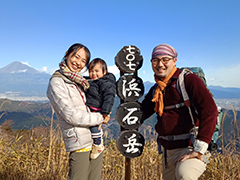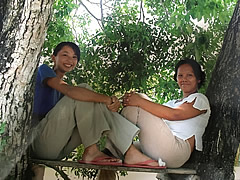Ms. Noriko Kato
Ms. Noriko KATO shares her experiences and thoughts on Belize. She was assigned to the Belize Family Life Association in Belize City from July 2003 to September 2005 as a volunteer in Youth Activities. Currently she works as a mid-wife in the obstetrics and gynecology department of a municipal hospital in Japan. Her experiences in Belize had a huge impact on her work and life and she shares her experience below:
"When I think of Belize, I always remember the young people I met through my volunteer activities. They were so free and thought outside the box. I can share several examples. I was strongly impressed by a boy who had a dream to establish a youth group. Thinking very freely, he planned and implemented fundraising events. He performed carnival dances in different events and successfully collected funds. I was also impressed by a boy who wrote a memorable poem for me at my farewell party. I was amazed at his grown-up sensibility. Each person I met in Belize was so free in thinking and doing. In my opinion Freedom is what characterizes Belize and in particular the Belizean youth is a mirror that reflects their society!
I was assigned to the NGO called the Belize Family Life Association (BFLA). As a volunteer I did various activities on sexual health education targeting young people. At that time there were problems such as unwanted pregnancy and sexually transmitted diseases including HIV/AIDS that were prevalent among the youth in Belize. Those were caused by the lack of opportunities to learn sexual and reproductive health and rights. The male-dominated culture of "machisimo" might be another cause of the problems. Together with my counterparts of BFLA, we set up a youth group to address these issues. We also implemented trainings for the members of the youth group and exhibited booths at local events. At the Independence Day carnival, we displayed a huge float decorated by the youth group members to publicize the importance of sexual and reproductive health and rights as well as prevention of HIV/AIDS.
My activities in Belize made me think of sexual health education in Japan. Although it is very important to learn sexual and reproductive health and rights, we are not educated enough in Japan. I thought that this is the theme that I should pursue for the rest of my life.
After returning to Japan, I went to university and obtained a midwifery license and now work in the obstetrics and gynecology department of a municipal hospital in Japan. During the course of my work, I really feel that pregnancy/childbirth/postpartum period can be a turning point in the life of women and their families, although it could be a big burden in terms of physical and mental point of view. I think it is an occasion for them to challenge themselves and mature as a person, even if some women have more serious matters such as adolescent pregnancy, postpartum depressions and domestic violence. Therefore, I want everyone to know more about pregnancy/childbirth/postpartum period at an early stage in their lives.
For that purpose, I give lectures on sexual health education at local junior high schools and high schools. In my next lecture, I am planning to talk about a story which I experienced in Belize. I had a Belizean friend who came from a village and had 11 siblings. Why did her mother give birth so many times? Perhaps it was because she did not have a chance to get educated, unequal relationship with her husband, or contraceptives were too expensive or unavailable. This is a story in Belize, but don't you think something similar could happen in Japan? It is said that "sexual health education is human rights education". So, I would like to pass on a message to young people to protect themselves and make the most of their own lives.
I have a one-year-old child and now I am very busy raising her. She is moving on and discovering new things every day. I try letting her go and not interfering too much. I love the time that I spend with her. I feel that parenting infants is truly "intercultural communication", so my experiences in Belize are particularly useful. The place where I live in Japan called "Izu" is surrounded by a rich natural environment. Together with my friends, I am planning to start a cooperative group for our children to play and enjoy nature. We want our children to grow as free as the youth in Belize not bounded by standards.
My experiences in Belize are fully utilized not only for my work but also for various points in my life. Present JOCV may have difficulties due to COVID-19, but I hope they have a chance to learn something from what they are facing now. The two years that I spent in Belize was definitely a special time for me. I want to express my appreciations to all the people I met in Belize for their kindness."







scroll